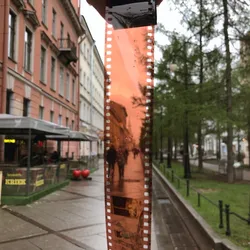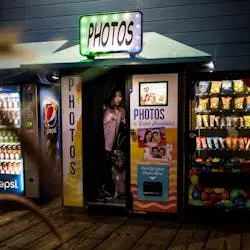
Level 1:
The movie party made people upset. They said, “Bad people!” Some people walked on a pretty rug. They said, “Those who did wrong stuff are here.” Some people didn’t like that. They shouted and pushed. The noisy group gave out papers. The papers said, “This party is not okay with us.”
Some people got told they did bad things. They were in trouble. One person said, “I didn’t do it.” Others said, “Yes, you did!” The old man talked about something called #MeToo. He said, “Sometimes people talk too much.” People clapped for him a lot.
People watched a new movie. They liked it. Some people said it was not good. They said it was the same as other movies. They wondered why.
Other movies played too. Some people watched but didn’t say bad things. The man who runs the party said, “I look at movies, not people.”
The party was strange. People argued. People liked some things and not others. It made people think a lot.
Level 2:
The film festival in Venice caused a big fuss because they showed movies from directors accused of bad things. People protested, shouting “No!” and holding signs. They were mad about Woody Allen, Roman Polanski, and Luc Besson being there. At Woody Allen’s movie, some folks yelled and even took off their shirts. The protesters handed out papers that said they didn’t like the festival’s choice. They wanted fairness for those who suffered and wondered if the festival cared. Allen, who was accused by his daughter, talked about the #MeToo movement but thought it sometimes went too far. The movie he showed got mixed reviews, and some said it felt repetitive.
Other films by Polanski and Besson were there too, and some people cried while watching. The festival’s director said he judges movies, not people’s actions, which made some wonder if that’s okay. In the end, the festival had good and bad moments, and it made many think about separating art from artists.
Full Story:
The 80th Venice International Film Festival recently hit the headlines, and not for all the glitzy, feel-good reasons you might expect. It made waves for featuring films by directors accused of sexual misconduct, sparking heated protests and debates.
Protesters Unleash Chaos
Picture this: a star-studded red carpet, flashing cameras, and excited fans. That’s the usual scene at film festivals, right? Well, not this time. At Venice, protesters disrupted the glamour with chants of “Abusers!” and “No rape culture!” Their fury was aimed at three directors accused of sexual misconduct: Woody Allen, Roman Polanski, and Luc Besson.
Things got wild at the premiere of Woody Allen’s 50th feature film, “Coup de Chance.” About 20 protesters marched past the cinema’s entrance, right when Allen was strutting down the red carpet. They weren’t holding back either. Some protesters even stripped off their shirts, adding an extra layer of intensity to the situation. There were scuffles with the police, and the chaos was palpable.
Voices of Protest
Who were these protesters? They were men and women affiliated with various Italian organizations, including the feminist group Non Una Di Meno. They weren’t just making noise; they had pamphlets in hand, condemning the festival for embracing directors like Allen, Besson, and Polanski.
Their pamphlets carried a clear message - violence must be taken seriously, and those who commit it can’t escape responsibility. But that’s not all; they demanded justice for the victims and questioned the festival’s choices. Are these accusations being swept under the red carpet?
The Accusations
Let’s dive into the accusations that ignited this fiery controversy. First up, Woody Allen. His adopted daughter, Dylan Farrow, has long claimed that he molested her back in 1992 when she was just seven years old. However, it’s essential to note that a prosecutor declined to bring charges against Allen.
Roman Polanski, on the other hand, pleaded guilty to the statutory rape of a 13-year-old girl in the US back in 1977. But here’s the twist - he fled the country before facing sentencing. That’s a fact that doesn’t sit well with many.
Luc Besson, the third director in the spotlight, was recently cleared of rape accusations by a French court in June. But the stench of these allegations still lingers.
Woody Allen’s Perspective
During the premiere, the 87-year-old director, Woody Allen, shared his thoughts. He mentioned his support for the #MeToo movement but cautioned against going to extremes. According to him, the movement could be overly zealous in turning non-offensive situations into issues.
He also raised a crucial point - major investigative bodies concluded that there was no merit to Dylan Farrow’s accusations. This begs the question: where should the line be drawn between allegations and evidence?
Standing Ovation Amidst Chaos
Here’s a head-turner - Woody Allen received a standing ovation inside the theater before his film, “Coup de Chance,” had even begun. The applause didn’t stop there. After the screening, Allen enjoyed a three-minute standing ovation. It might have gone on longer if the filmmaker hadn’t started to exit. He even had to pull out a tissue, overwhelmed by the reaction.
The mixed reactions within the audience raise intriguing questions. Are the allegations against Allen less important than his work? Or is the audience merely separating the artist from the accusations?
Film Reviews and Opinions
So, what about the film itself? Variety critic Owen Gleiberman praised “Coup de Chance” as Allen’s best movie since “Blue Jasmine.” On the flip side, Caspar Salmon, writing for the Daily Beast, had a different take. He labeled the film an “exhausting and lazy retread of all his tried, true, and tired ideas.” It’s an interesting divide in opinions, and it begs the question of whether the controversy surrounding Allen overshadowed the film itself.
Other Screenings and Emotions
The festival featured films by Roman Polanski and Luc Besson as well. Polanski’s film, “The Palace,” hit the screen earlier, but the director himself was absent. As for Luc Besson, he attended the screening of his 21st feature, “Dogman.” The film received a six-minute standing ovation, and Besson was even seen wiping away tears. Curiously, there was no sign of protest during his screening.
These reactions paint a complex picture. Are audiences willing to separate the art from the artist, or do emotions run too deep to do so?
In Defense of Controversy
Venice Film Festival director Alberto Barbera didn’t back down from the festival’s decision to feature directors like Allen and Polanski. He made a distinction between the personal responsibilities of individuals and the artistic qualities of their work. According to Barbera, he’s a festival director, not a judge. He evaluates the artistic merit of films, leaving judgments about personal conduct to others.
This raises another question - should artists’ work be weighed separately from their personal lives? Are we capable of making that separation?
Conclusion: A Tale of Controversy
In the heart of Venice, the 80th International Film Festival became a battleground for questions that have long plagued the entertainment industry. Can we, as viewers, divorce the art from the artist when accusations of misconduct hang in the air? Is it fair to applaud a filmmaker while their past remains mired in controversy?
The chaos on the red carpet and the stark divide in opinions within the audience reflect the broader societal debate. How we navigate these complex waters as consumers of art remains an open question. One thing’s for sure - the 80th Venice International Film Festival won’t be forgotten anytime soon.
Questions:
Question: Were there any protests at the Venice Film Festival, and why were they happening?
Answer: Yes, there were protests at the Venice Film Festival. People were protesting because the festival was featuring movies made by directors who have been accused of doing bad things. They didn’t think it was right for Woody Allen, Roman Polanski, and Luc Besson to be part of the festival, given the accusations against them.
Question: How did the protesters express their disapproval, and what were they demanding?
Answer: The protesters expressed their disapproval by shouting slogans like “Abusers!” and “No rape culture!” Some even removed their shirts, and there were scuffles with the police. They were demanding fairness and justice for the victims of the accused directors. They also handed out pamphlets that criticized the festival’s decision to include these directors and questioned if the festival cared about those who had suffered.
Question: What did Woody Allen say about the #MeToo movement, and how did the audience react to him at the premiere?
Answer: Woody Allen said he supported the #MeToo movement but thought it sometimes went too far in making minor things into big issues. At the premiere, he received a standing ovation both before and after the screening. The audience clapped for him for about three minutes, and he seemed touched by their reaction.
Question: What were the reviews of Woody Allen’s film, “Coup de Chance,” at the festival?
Answer: Reviews of Woody Allen’s film, “Coup de Chance,” were mixed. Some critics praised it as his best work since “Blue Jasmine.” However, others were less impressed, describing it as a repetitive and tired retread of his previous ideas.
Question: How did the festival’s director, Alberto Barbera, defend the decision to include directors like Woody Allen and Roman Polanski in the festival?
Answer: The festival’s director, Alberto Barbera, defended the decision by saying that he evaluates the artistic quality of films and doesn’t judge the personal actions of the directors. He believes it’s essential to separate the art from the artist, leaving judgments about their behavior to others.
Fill in the Blanks:
responsibility, navigate, misconduct, affiliated, accusations, Controversy, investigative, mired, Emotions, zealous, Controversial, Accusations, fury, accused, emotions, allegations, condemning, divorce, controversy, pamphlets, premiere, judgments, battleground, overwhelmed, support, extremes, applaud, protesters, scuffles, complex, Protesters
________ Film Fest Premieres
The 80th Venice International Film Festival recently hit the headlines, and not for all the glitzy, feel-good reasons you might expect.
It made waves for featuring films by directors ________ of sexual ________, sparking heated protests and debates.
________ Unleash Chaos
Picture this: a star-studded red carpet, flashing cameras, and excited fans.
At Venice, ________ disrupted the glamour with chants of “Abusers!” and “No rape culture!” Their ________ was aimed at three directors accused of sexual misconduct: Woody Allen, Roman Polanski, and Luc Besson.
Things got wild at the ________ of Woody Allen’s 50th feature film, “Coup de Chance.” About 20 protesters marched past the cinema’s entrance, right when Allen was strutting down the red carpet.
There were ________ with the police, and the chaos was palpable.
They were men and women ________ with various Italian organizations, including the feminist group Non Una Di Meno.
They weren’t just making noise; they had ________ in hand, ________ the festival for embracing directors like Allen, Besson, and Polanski.
Their pamphlets carried a clear message - violence must be taken seriously, and those who commit it can’t escape ________.
Are these ________ being swept under the red carpet?
The ________
Let’s dive into the accusations that ignited this fiery ________.
But the stench of these ________ still lingers.
He mentioned his ________ for the #MeToo movement but cautioned against going to ________.
According to him, the movement could be overly ________ in turning non-offensive situations into issues.
He also raised a crucial point - major ________ bodies concluded that there was no merit to Dylan Farrow’s accusations.
He even had to pull out a tissue, ________ by the reaction.
Other Screenings and ________
The festival featured films by Roman Polanski and Luc Besson as well.
These reactions paint a ________ picture.
Are audiences willing to separate the art from the artist, or do ________ run too deep to do so?
In Defense of ________
Venice Film Festival director Alberto Barbera didn’t back down from the festival’s decision to feature directors like Allen and Polanski.
He evaluates the artistic merit of films, leaving ________ about personal conduct to others.
Conclusion: A Tale of Controversy
In the heart of Venice, the 80th International Film Festival became a ________ for questions that have long plagued the entertainment industry.
Can we, as viewers, ________ the art from the artist when accusations of misconduct hang in the air?
Is it fair to ________ a filmmaker while their past remains ________ in controversy?
How we ________ these complex waters as consumers of art remains an open question.
Vocabulary:
Controversial: Arousing strong disagreement or argument.
Protesters: People who participate in a public demonstration or rally to express their objections or grievances.
Red carpet: A ceremonial carpet, often used at events, on which VIPs and celebrities walk.
Accused: Someone who is charged with a wrongdoing or crime.
Misconduct: Unacceptable or improper behavior, often related to breaking rules or laws.
Premiere: The first public showing or presentation of a movie or performance.
Scuffles: Brief, unplanned fights or conflicts.
Fury: Intense anger or outrage.
Affiliated: Connected or associated with a particular group or organization.
Pamphlets: Small, printed booklets or brochures containing information or opinions.
Condemning: Expressing strong disapproval or criticism.
Responsibility: The state of being accountable or answerable for something.
Swept under the carpet: To hide or ignore a problem or issue instead of addressing it.
Accusations: Claims or charges that someone has done something wrong or illegal.
Support: To endorse or be in favor of something.
Extremes: The furthest or most intense point of something.
Zealous: Showing intense enthusiasm or fervor for a cause or belief.
Investigative: Involving the process of examining or researching something in-depth.
Allegations: Assertions or claims made, typically without concrete proof.
Overwhelmed: To be deeply affected or emotionally moved by something.
Mixed reactions: Differing responses or opinions from people.
Controversy: A prolonged public dispute or debate, often about a sensitive issue.
Artistic qualities: The characteristics that make a piece of art or creative work unique and valuable.
Complex: Complicated or consisting of many interconnected parts.
Emotions: Feelings or states of mind, such as happiness, sadness, or anger.
Judgments: Opinions or decisions formed after careful consideration.
Divorce: In this context, it means to separate or disconnect one thing from another.
Applaud: To show approval or praise by clapping one’s hands.
Mired: To be stuck or deeply involved in a difficult or unpleasant situation.
Battleground: A place or situation where a conflict or struggle takes place.
Navigate: To find a way through or manage a situation or problem.




